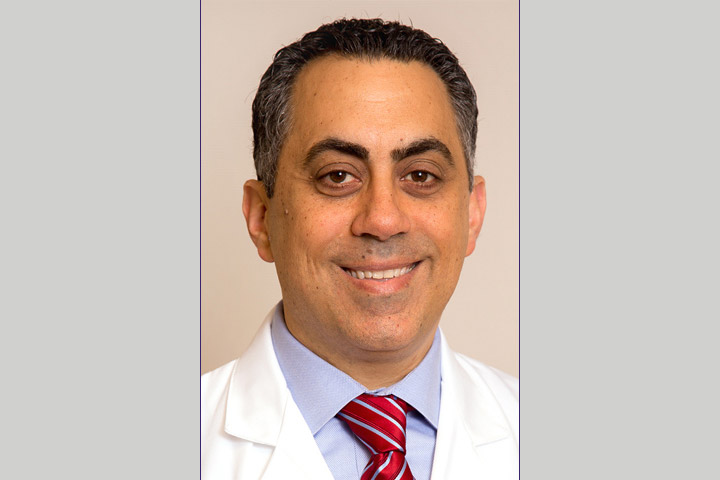KRYSTAL-1 Trial Shows Promising Activity in Pancreas and Other GI Cancers

As a physician–scientist who conducts clinical and translational research focusing on gastrointestinal cancers, Tanios Bekaii-Saab, M.D., rarely gets excited about early-phase trial data.
After all, he’s seen too many agents look promising only to fail in larger trials. But such is the nature of science, says Bekaii-Saab, one of the leading physician–scientists in the Alliance for Clinical Trials in Oncology, a National Cancer Institute-supported cooperative research group.
Pancreatic cancer is a particularly tough disease. It’s tough to diagnose early and for myriad reasons it’s tough to treat once it has metastasized. The most common genetic driver of pancreatic cancer comes from mutations in the KRAS gene, which occur in about 90 percent of pancreatic tumors. But its structure—similar to a smooth ball with no grooves or pockets where a targeted inhibitor could attach—made KRAS seemingly undruggable.
Fortunately, that may not be the case anymore. Novel agents are being developed that target a very specific mutation within KRAS—dubbed KRAS G12C. One such KRAS G12C inhibitor is called adagrasib.
Very Positive Data
At the 2022 ASCO Gastrointestinal Cancers Symposium, Bekaii-Saab presented data showing that a disease control rate of 100 percent was achieved in pancreatic cancers treated with adagrasib in the phase II KRYSTAL-1 trial. Adagrasib, taken as a single agent, also resulted in a 50 percent partial response rate among pancreatic cancer patients enrolled in the study.
KRAS G12C occurs in about 2 percent of pancreatic cancers. Although that may seem like a small percentage, overall the need for more effective treatments for metastatic patients is great, says Bekaii-Saab, who leads the gastrointestinal cancer program for the Mayo Clinic Cancer Center (Phoenix, Arizona) and is Professor of Medicine at the Mayo Clinic College of Medicine and Science. He also serves as medical director of the Cancer Clinical Research Office.
“Once chemotherapy fails for pancreas cancer patients, there are limited options for them,” he adds. “It’s fair to say I’m excited about this data, and I don’t say that very often.”
The data was also a “nice surprise.”
“Overall, in pancreas cancer we have had so many negatives,” Bekaii-Saab notes. “We might test a drug and every patient with a GI cancer is getting a response, except those with pancreas cancer. So we were very nervous looking at the results of this study.
“Once we saw the results and realized every single pancreas cancer patient either had a response or stable disease, we were amazed. This is really promising, especially since these patients were so heavily treated with two, three, four lines of prior therapies.
“There was nothing else for them, and now maybe there will be something for this subset of patients. We don’t know for sure yet, and I tend toward caution. But I am really very hopeful.”
About the Study
Study participants at the time of data cutoff included 42 patients with solid tumors (lung and colorectal cancers were not included in this trial), of whom 30 had gastrointestinal tumors harboring a KRAS G12C mutation.
This group included 12 patients with pancreatic adenocarcinoma, eight with biliary tract cancer, five with appendiceal cancer, two with gastroesophageal junction cancer, two with small bowel cancer, and one with esophageal cancer. Patients had received a median of two prior lines of therapy. Previously treated patients received adagrasib at the recommended dose of 600 mg twice daily. The primary endpoints included objective response rate and safety measures.
All patients had undergone prior treatments and had no other treatment options. Of 12 patients with pancreatic cancer, 10 were evaluable for clinical activity after a median follow-up of 8.1 months. Within this subgroup, five partial responses were observed, and five additional patients achieved stable disease, yielding a disease control rate of 100 percent. Median duration of response was 7 months, and median progression-free survival was 6.6 months. Treatment was ongoing in 50 percent of patients at the time of analysis.
In the 17 patients with other gastrointestinal tumors who were evaluable for response, there were six partial responses (35 percent), including in four of eight patients with biliary tract cancer. The one patient with gastroesophageal cancer responded, as did one of the two patients with small bowel cancer. Median duration of response was 7.9 months, and median progression-free survival was 7.9 months. At the time of analysis, 11 patients were still receiving adagrasib.
Adagrasib was also fairly well tolerated, with no grade 4 or greater adverse events. Treatment-related adverse events included nausea, diarrhea, vomiting, and fatigue. Adagrasib’s long half-life and significant tissue distribution are also important attributes, says Bekaii-Saab.
“Toxicities are part of treatment overall,” he explains. “We can’t administer an agent without expecting some damage. In this study there was no stopping of the drug due to toxicity, and that’s important.
“Other KRAS inhibitors like sotorasib had a response rate of less than 10 percent in pancreas and other gastrointestinal tumors in their initial reports,” adds Bekaii-Saab. “So these findings were significant, and we need to keep exploring [adagrasib’s] use in multiple tumor types.”
Early results from the trial led the U.S. Food and Drug Administration to grant adagrasib a Breakthrough Therapy designation for patients with advanced KRAS G12C-mutated non-small cell lung cancer; more recent results show favorable clinical activity in patients with advanced colorectal cancer.
Other Agents in Development
Scientists are chipping away at other KRAS mutations with other targeted agents. One such agent is MRTX1133, which targets the KRAS G12D mutation, which is the most prevalent KRAS mutation in pancreatic cancer.
“We’re learning more all the time,” says Bekaii-Saab. “For years we thought KRAS couldn’t be targeted, and now new agents are being developed. The hope is that maybe these agents will actually transform how we treat advanced pancreas cancers. Our patients have fought very long and very hard. They need our help.”





